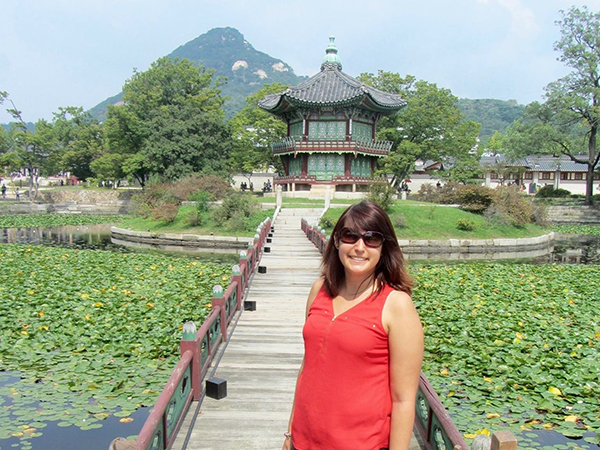 Amanda Pentecost is a recent Department of Materials Science and Engineering PhD graduate and NSF Graduate Research Fellow who performed research in the Nanomaterials Group with Distinguished University and Charles T. and Ruth M. Bach Professor Yury Gogotsi and Professor Kara Spiller. Amanda traveled to South Korea as a dual Whitaker and Boren Fellow.
Amanda Pentecost is a recent Department of Materials Science and Engineering PhD graduate and NSF Graduate Research Fellow who performed research in the Nanomaterials Group with Distinguished University and Charles T. and Ruth M. Bach Professor Yury Gogotsi and Professor Kara Spiller. Amanda traveled to South Korea as a dual Whitaker and Boren Fellow.
My time as both a Whitaker and Boren Fellow has helped me to become a more well-rounded international and interdisciplinary researcher. In learning how to perform animal studies at the Korea Institute of Science and Technology, I came to appreciate the necessity of translational research, particularly in studying biomaterial-immune system interactions. My time in Korea also further strengthened my belief that bringing researchers of different cultural backgrounds together through international collaborations is essential to developing unique solutions to complex world problems. As a result of these experiences, I became more interested in standards development and regulatory affairs, especially in the context of globalization. Therefore, I am very excited to be pursuing a career as a Biomedical Engineering consultant at Exponent, where I will be able to learn more about how national and international standards and regulations regarding medical devices are formed and implemented.
My Ph.D. research focused on using therapeutic nanoparticles to treat chronic inflammatory diseases, like rheumatoid arthritis. Currently, the gold standard of treatment, which includes the delivery of corticosteroid drugs, has many negative side-effects, including suppression of the immune system and drug resistance. Originally, my research was focused on conjugating these drugs to nanoparticles in order to promote targeted delivery to immune cells, and consequently abrogate these effects. However, I made an interesting discovery; by simply modifying the surface groups on my nanoparticles, I could promote the same anti-inflammatory effects! This discovery has the potential to be extremely useful to other researchers who are studying ways to combat inflammatory diseases, as it negates the need for drugs. There is still much work needed to be done in the field, as a myriad of other nanoparticle materials and surface chemistries require investigation.